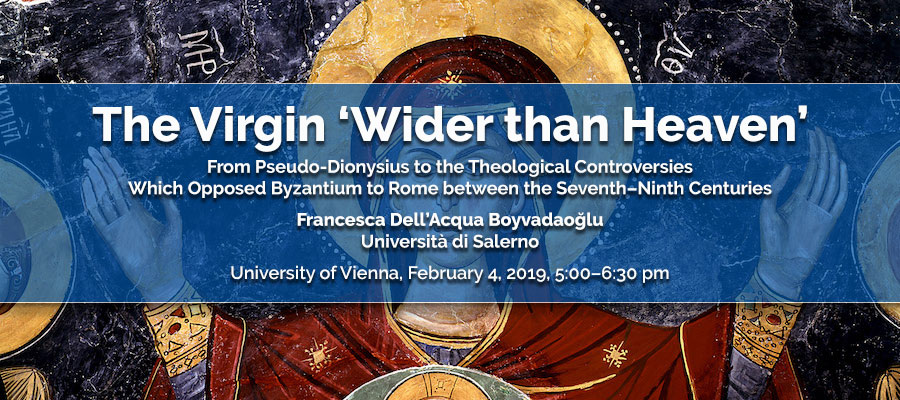The Virgin ‘Wider than Heaven’. From Pseudo-Dionysius to the Theological Controversies Which Opposed Byzantium to Rome between the Seventh–Ninth Centuries, discussion with Francesca Dell’Acqua Boyvadaoğlu (Università di Salerno), University of Vienna, February 4, 2019, 5:00–6:30 pm
The Forum Moving Byzantium XVIII will provide the unique opportunity to discuss with Ass. Prof. Francesca Dell’Acqua Boyvadaoğlu (Università di Salerno) her current work on “The Virgin ‘Wider than Heaven’. From Pseudo-Dionysius to the Theological Controversies Which Opposed Byzantium to Rome between the Seventh–Ninth Centuries”.
Francesca Dell’Acqua is Assistant Professor in History of Medieval Art at the University of Salerno and holds the Habilitation to Associate Professorship. Her current work explores the idea of Mary as emblem of wisdom and authority in the medieval period and how this impacted on the idea of female authority and leadership in past and present societies.
Her presentation fits into the strand of the ‘Moving Byzantium’ Project that deals with ‘People, Texts, and Ideas on the Move’. It will investigate the intangible cultural transfer of texts, religious thought, and figural images. It will also touch upon the question of figural images as being related to high or low culture between the eastern Mediterranean and the Latin West. The idea of the Platytéra, that is the Virgin Mary with a womb ‘wider than heaven’, is alluded to by the pseudo-apostolic author Dionysius the Areopagite in his treatise on the Divine Names. Perhaps by no coincidence its earliest known figural developments coincide in dating with his writings. The textual and material image of the Platytéra was used to emphasise the mystery of the Incarnation of an incommensurable God in the small womb of a woman, and also to extol this very woman and her role in the divine economy of salvation.
This presentation will address the fact that the Platytéra was connected to Mary’s Assumption into heaven because Christian exegetes believed that she deserved an exceptional transition to the afterlife as she had once contained the uncontainable God in her womb. It will first address the question of Mary’s Dormition and Assumption into heaven, and then the related concept of the Platytèra. It will highlight the role of Pseudo-Dionysius and of Greek homilies on the Dormition composed between the seventh– eighth centuries and their reception in the Latin West. Finally, it will refer to figural renderings of the Platytéra which articulate a refined discourse about the womb of Mary as ‘wider than heaven’ – a discourse pitched at an intellectually high audience.
After a short introduction by Ass. Prof. Dell’Acqua, there will be time for discussion moderated by Prof. Karin Krause (University of Chicago) on the basis of preparatory readings.
